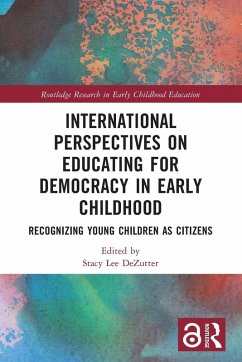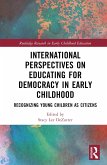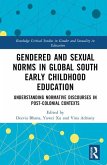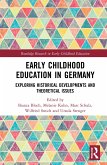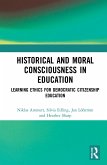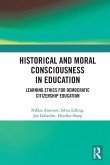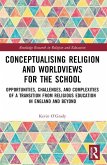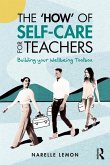This book brings together established and emerging scholars from around the globe to highlight new directions for research on young children as active, engaged citizens of classrooms.
Divided into three sections, the volume draws on innovative methods to explore diverse conceptualizations of citizenship, children's understandings, and effective practice. Rejecting traditional views of children as citizens-in-preparation, the volume explores how young children can and do live as citizens, and how early childhood educational settings serve as civic forums. Chapters discuss the child-as-citizen in relation to issues including gender, class, race, tribal status, and linguistic diversity, and ultimately illustrate how sociocultural processes in early years settings can be harnessed to promote the development of democratic dispositions and skills.
This book establishes citizenship enactment in early childhood education as a robust and growing research area with the potential to shape research, policy, and practice worldwide. As such, it will appeal to researchers and academics with an interest in citizenship education, democracy, and early childhood education, as well as postgraduate students of teacher education and those working across international and comparative education more broadly.
Chapter 20 of this book is freely available as a downloadable Open Access PDF at http://www.taylorfrancis.com under a Creative Commons [Attribution-Non Commercial-No Derivatives (CC-BY-NC-ND)] 4.0 license.
Divided into three sections, the volume draws on innovative methods to explore diverse conceptualizations of citizenship, children's understandings, and effective practice. Rejecting traditional views of children as citizens-in-preparation, the volume explores how young children can and do live as citizens, and how early childhood educational settings serve as civic forums. Chapters discuss the child-as-citizen in relation to issues including gender, class, race, tribal status, and linguistic diversity, and ultimately illustrate how sociocultural processes in early years settings can be harnessed to promote the development of democratic dispositions and skills.
This book establishes citizenship enactment in early childhood education as a robust and growing research area with the potential to shape research, policy, and practice worldwide. As such, it will appeal to researchers and academics with an interest in citizenship education, democracy, and early childhood education, as well as postgraduate students of teacher education and those working across international and comparative education more broadly.
Chapter 20 of this book is freely available as a downloadable Open Access PDF at http://www.taylorfrancis.com under a Creative Commons [Attribution-Non Commercial-No Derivatives (CC-BY-NC-ND)] 4.0 license.
At first blush, "Children as citizens" seems a category error-but it's actually the provocative theme of this collection. Scholars representing different nations, disciplines, and educational perspectives describe milieus in which children's behaviors, thoughts, and emotions are taken seriously. A worthwhile and mind-expanding read.
-- Howard Gardner, Hobbes Research Professor of Cognition and Education, Harvard Graduate School of Education
A beautiful example of "think globally, act locally", this volume offers important opportunities for teachers, researchers, and policy makers to learn from one another about how education can support children's democratic participation now and in the future.
-- Ben Mardell, Principal Investigator, Project Zero at the Harvard Graduate School of Education
Any educator seeking to expand the definition of 'students' from 'passive learners' to 'active citizens' should read Educating for Democracy in Early Childhood. It's a roadmap to help both school leaders and teachers shift the lens through which they view students and empower children to shape and improve their communities.
-- Cynthia Robinson-Rivers, Partner at Transcend and Founder of the Whole Child Model
I welcome this volume with great excitement as a timely contribution to scholarship and policy making. It achieves is a much-needed push for radical/critical perspectives that open ways to acknowledge children as actors of world- and history-making. A strong theoretical frame leads, not surprisingly, to clear practical and policy applications.
-- Anna Stetsenko, Professor, The Graduate Center of The City University of New York
International Perspectives on Educating for Democracy in Early Childhood brings together fresh, timely and much-needed insights about preparing and supporting young children's active citizenship. The breadth of work included is significant, and means that the book offers a great deal that will be of interest to those involved in research and practice in this area. Collectively and individually, the chapters offer a critical - and yet where appropriate hopeful - analysis of the challenges and opportunities involved in recognising and enabling the young children as citizens. I highly recommend it.
-- Andrew Peterson, University of Birmingham, UK
-- Howard Gardner, Hobbes Research Professor of Cognition and Education, Harvard Graduate School of Education
A beautiful example of "think globally, act locally", this volume offers important opportunities for teachers, researchers, and policy makers to learn from one another about how education can support children's democratic participation now and in the future.
-- Ben Mardell, Principal Investigator, Project Zero at the Harvard Graduate School of Education
Any educator seeking to expand the definition of 'students' from 'passive learners' to 'active citizens' should read Educating for Democracy in Early Childhood. It's a roadmap to help both school leaders and teachers shift the lens through which they view students and empower children to shape and improve their communities.
-- Cynthia Robinson-Rivers, Partner at Transcend and Founder of the Whole Child Model
I welcome this volume with great excitement as a timely contribution to scholarship and policy making. It achieves is a much-needed push for radical/critical perspectives that open ways to acknowledge children as actors of world- and history-making. A strong theoretical frame leads, not surprisingly, to clear practical and policy applications.
-- Anna Stetsenko, Professor, The Graduate Center of The City University of New York
International Perspectives on Educating for Democracy in Early Childhood brings together fresh, timely and much-needed insights about preparing and supporting young children's active citizenship. The breadth of work included is significant, and means that the book offers a great deal that will be of interest to those involved in research and practice in this area. Collectively and individually, the chapters offer a critical - and yet where appropriate hopeful - analysis of the challenges and opportunities involved in recognising and enabling the young children as citizens. I highly recommend it.
-- Andrew Peterson, University of Birmingham, UK

